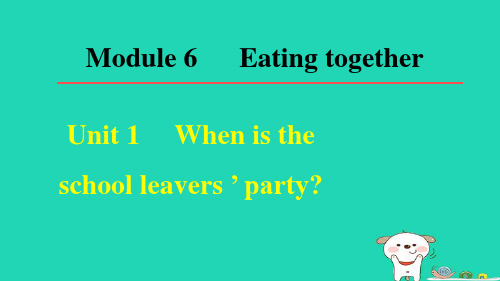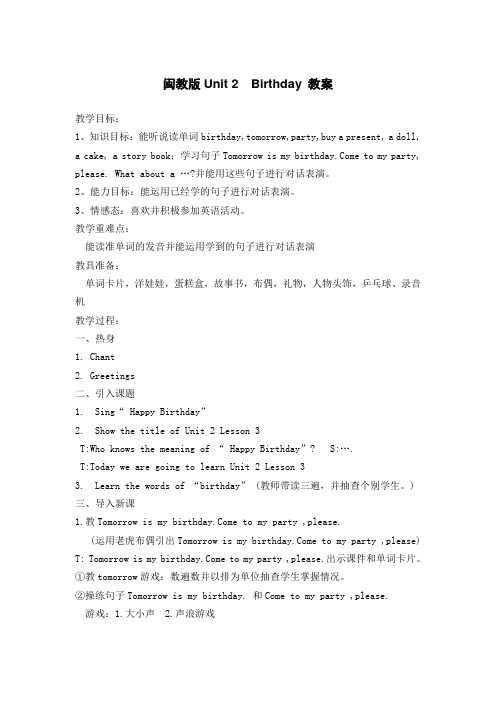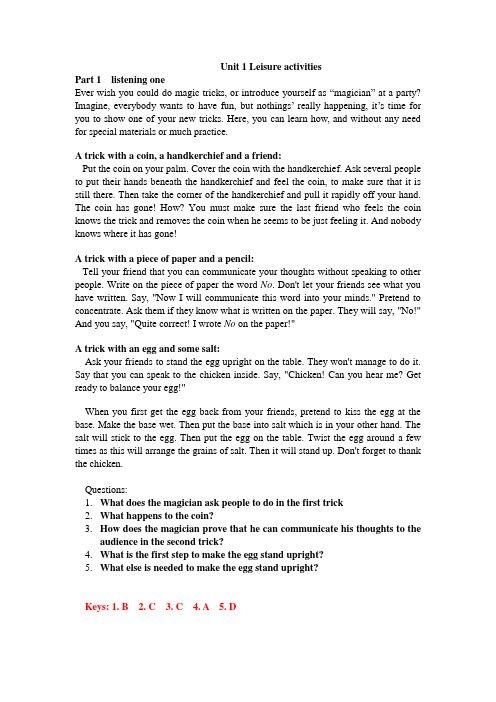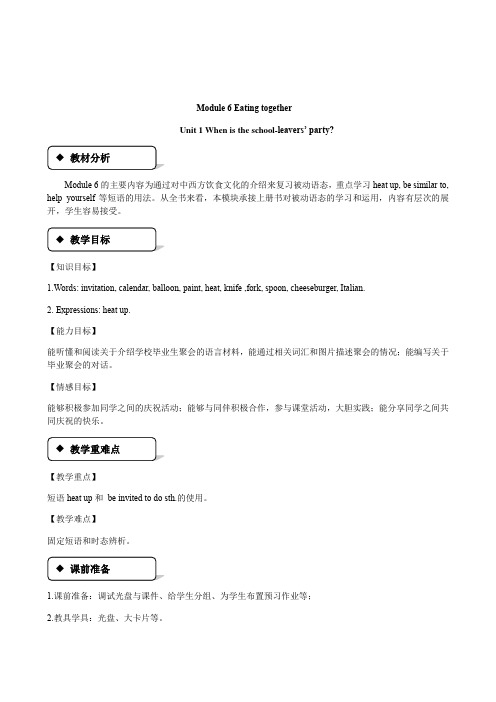Unit1 Party
九年级英语下册M6 Unit 1新版外研版

6. Work in pairs. Read the conversation in Activityrs. Make plans for a party. Think about: •food and drink •music and dancing
pictures for the party.
Betty: The teachers have asked everyone to prepare a traditional dish from their home country. ④
作可数名词, 可意为“菜肴, 一道菜”, 还可意为“碟, 盘”, the dishes 意为“(待清洗的) 餐具”。
cooked at home. What are you going to make? Now listen and check.
Learning to learn You can use English to communicate with people from all over the world-take your chance to learn something about how they live and what they eat. Learning about other cultures is not only interesting, it will also help you understand the world better.
《He decided to have a big Christmas party》中职英语(基础模块 第3册)Unit 1【高教版】2

Discuss and act.
Mid-autumn Festival
A: ________________________ B: ________________________ A: ________________________ B: ________________________ A: ________________________ B: ________________________
Party Information Card
Time: Christmas
Place:
on_t_h_e_r_i_ve_r__________________
Mr_H_a_l_l’__s important friends sit in the armchairs on the carpets
enjoy beautiful scenery and _________________________
Lynn: A Halloween party? It sounds interesting but I prefer to stay at Jack: home. Lynn: Why? You will have a lot of fun if you join us.
Maybe you are right, but I had no fun at my last Halloween party. Jack: It was terrible. Lynn: What happened?
2. _W__h_y_d_i_d_h_i_s_f_r_ie_n_d_s__t_h_in_k__h_a_v_in_g__t_h_e_p_a_r_t_y_o_n__th__e_i_c_e_w_a_s__a________ _wBe_oc_anu_sd_ee_tr_hf_ueyl iwdereeaa?ble to enjoy beautiful scenery and all the delicious food on the ice. __________________________________________________________
闽教版英语三年级下册Unit1Birthday教案2

闽教版Unit 2 Birthday 教案教学目标:1、知识目标:能听说读单词birthday,tomorrow,party,buy a present, a doll,a cake, a story book;学习句子Tomorrow is my e to my party, please. What about a …?并能用这些句子进行对话表演。
2、能力目标:能运用已经学的句子进行对话表演。
3、情感态:喜欢并积极参加英语活动。
教学重难点:能读准单词的发音并能运用学到的句子进行对话表演教具准备:单词卡片,洋娃娃,蛋糕盒,故事书,布偶,礼物,人物头饰,乒乓球、录音机教学过程:一、热身1. Chant2. Greetings二、引入课题1. Sing“ Happy Birthday”2. Show the title of Unit 2 Lesson 3T:Who knows the meaning of “ Happy Birthday”? S:….T:Today we are going to learn Unit 2 Lesson 33. Learn the words of “birthday” (教师带读三遍,并抽查个别学生。
)三、导入新课1.教Tomorrow is my e to my party ,please.(运用老虎布偶引出Tomorrow is my e to my party ,please) T: Tomorrow is my e to my party ,please.出示课件和单词卡片。
①教tomorrow游戏:数遍数并以排为单位抽查学生掌握情况。
②操练句子Tomorrow is my birthday. 和Come to my party ,please.游戏:1.大小声 2.声浪游戏T:Tomorrow is my e to my party ,please.party,you know ,party? S:…..T: party,party,come to my party.教师出示单词卡片和课件。
Unit1 --Unit5 重要知识点(素材)译林版(三起)英语六年级下册

六下Unit1---Unit5重要知识点 Unit1 The lion and the mouse P6—7 1. walk by 走过 2. wake sb. up 把某人吵醒 wake her up 把她吵醒
3. some day 某一天(指将来某一天)
4. one day 某一天(指过去某一天或将来某一天)
5. his sharp teeth 他的锋利的牙齿
6. just then 就在那时(用于一般过去时)
7. the next day 第二天(用于一般过去时)
8. make a big hole in the net 在网上弄了个大洞
9. get out 出去
10. from then on 从那时起(用于一般过去时)
11. become friends 成为朋友 become windy and cloudy 变得多风多云 The mouse made a big hole in the net with his teeth. =The mouse used his teeth to make a big hole in the net.
Two men caught the lion with a large net. =Two men used a large net to catch the lion.
P 9 方式副词用来描述动作发生的方式,能生动形象地表现动作。(副词修饰动词,放在动词后。)
He is a happy boy. He laughs happily. 形容词修饰名词,副词修饰动词。 形容词和副词之间的转换:
1. 形容词+ly 变副词 excited—excitedly beautiful—beautifully quiet——quietly careful—carefully loud—-loudly wonderful—wonderfully sad——sadly
大学英语视听说四级UNIT 1 音频原文及其答案

Unit 1 Leisure activitiesPart 1 listening oneEver wish you could do magic tricks, or introduce yourself as “magician” at a party? Imagine, everybody wants to have fun, but nothings’really happening, it’s time for you to show one of your new tricks. Here, you can learn how, and without any need for special materials or much practice.A trick with a coin, a handkerchief and a friend:Put the coin on your palm. Cover the coin with the handkerchief. Ask several people to put their hands beneath the handkerchief and feel the coin, to make sure that it is still there. Then take the corner of the handkerchief and pull it rapidly off your hand. The coin has gone! How? You must make sure the last friend who feels the coin knows the trick and removes the coin when he seems to be just feeling it. And nobody knows where it has gone!A trick with a piece of paper and a pencil:Tell your friend that you can communicate your thoughts without speaking to other people. Write on the piece of paper the word No. Don't let your friends see what you have written. Say, "Now I will communicate this word into your minds." Pretend to concentrate. Ask them if they know what is written on the paper. They will say, "No!" And you say, "Quite correct! I wrote No on the paper!"A trick with an egg and some salt:Ask your friends to stand the egg upright on the table. They won't manage to do it. Say that you can speak to the chicken inside. Say, "Chicken! Can you hear me? Get ready to balance your egg!"When you first get the egg back from your friends, pretend to kiss the egg at the base. Make the base wet. Then put the base into salt which is in your other hand. The salt will stick to the egg. Then put the egg on the table. Twist the egg around a few times as this will arrange the grains of salt. Then it will stand up. Don't forget to thank the chicken.Questions:1.What does the magician ask people to do in the first trick2.What happens to the coin?3.How does the magician prove that he can communicate his thoughts to theaudience in the second trick?4.What is the first step to make the egg stand upright?5.What else is needed to make the egg stand upright?Keys: 1. B 2. C 3. C 4. A 5. D(The following is an interview from a weekly sports program.)Presenter: Good morning, listeners. Welcome to our weekly sports program aimed at all those underactive youngsters with time on their hands! Listen to whatour two guests have to say about their hobbies and how their hobbies havemade a difference to their lives. Adrienne first, then, Jonathan. Adrienne: I collect very interesting jewelry. I tend to travel a lot as most of my family do, so whenever I have a holiday, I like to go traveling. Whenever I travelsomewhere, I like to pick up something to remind me of the place that Ivisited. And, the easiest thing to do is to pick up a small piece of jewelryinstead of getting a poster or a T-shirt that won’t last. I like the idea ofhaving something small and also, I find whenever I wear jewelry fromsomewhere, it’s a good conversation piece. Usually people ask you, “Wheredid you get this?” I then have a story to tell, and it’s a good way to meet andtalk to people. It’s just interesting. I have jewelry that I picked up when Itraveled to Thailand, when I traveled to Africa and when I traveled toEurope.Presenter: Wow! Sounds nice. You’ll have to show your collections to us. Adrienne: I’d love to.Presenter: Thank you, Adrienne. Now Jonathan.Jonathan: I prefer canoeing because you've always got the water there for support. If you're a good swimmer, have a good sense of balance and strong arms,you'll like canoeing! The main trouble is transporting your canoe to theright places—my father takes it on the roof of the car—or sometimes I put iton the roof of the club’s Land Rover. What it has taught me most is to beindependent. It's just you and the canoe against the wind, the weather andthe water. It gives you a lot of self-confidence and it can be really excitingas long as you don't mind getting soaked, of course! It makes you feel closeto nature somehow. Last year, when I was qualified, I began to run my owncanoeing center.Presenter: So you are making your hobby work for you.Jonathan: People are usually very skilled at their hobbies. The combination of interest and skills is a very compelling reason to choose a particular career. Presenter: Then, Adrienne, do you have a similar plan?Adrienne: Yes, I love making beaded jewelry. I’ve decided to get some formal training. I want to learn how to be a jewelry designer.Questions:1. Who is the target audience in the program?2. What is Adrienne’s hobby?3. What does Adrienne usually buy when she visits a place?4. How does Jonathan benefit from canoeing?5. What should be the major concern in choosing a career according to Jonathan? Keys: 1. A 2. B 3. D 4. C 5. BGerry: I've just been to see Gone with the Wind. It was fantastic. Well worth seeing.Have you ever seen it?Judy : N o, but I've read the book. I don't think I would like to see the film really. It would spoil the story for me.Gerry: Really? Oh, give me a film any day. Honestly, if I had to choose between the film of a story and the book of it, I'd go for the film.Judy : Would you?Gerry: Yes. It's much more real. You can get the atmosphere better. You know, the photography and location shots, period costumes, the right accents. Don't youthink so?Judy : Not really. I much prefer to use my own imagination. I can imagine how I want it, rather than how someone makes me see it. Anyway, I think you get much more insight into the characters when you read a book. Part of a person's character is lost on film because you never know what they are thinking. Gerry: True, but I don't know. It's much easier going to the cinema. It takes less time.I can get the whole story in two hours but it might take me a week to read thebook.Judy : I know, but it's so expensive to go to the cinema nowadays.Gerry: I know, but it's a social event. It's fun. You can go with your friends. When you read a book you have to do it on your own.Judy : All right. Let's agree to differ. I'll get some coffee.Keys:1.1.spoil the story1.2.and day1.3.Honestly choose the film1.4.Atmosphere photography location period1.5.insight into the characters1.6.social event1.7.agree to differ2.Films: get the atmosphere better---photography/location shots/periodcostumes/right accenteasiertake less time: two hoursan social event: fun, go with friendsBooks: take more time: one weeknot a social event: do it on your ownbooks: use readers’ own imaginationget much more insight into the charactersfilms: spoil the storyexpensiveSally Marino gets married. After the wedding, there is a big party—a wedding reception. All the guests eat dinner. There is a band and, after dinner, everyone dances. Sally's mother and father pay for everything. At the end of the reception, Sally and her new husband cut the wedding cake and all the guests get a piece.Pete and Rose buy a new house. After moving in, they invite their friends and family to a party—a housewarming party. Everybody comes to see the new house. They look at the bedrooms, the dining room, even the garage. Pete and Rose serve drinks, sandwiches, and snacks. The party is on a Saturday afternoon.It is Christmas time. Ted and Sarah Robinson want to see many of their friends over the holiday. So they invite their friends to an open house. The hours of the party are from 2 p.m. to 8 p.m. The guests arrive and leave whenever they want. The Robinsons serve sandwiches, drinks, and snacks. Some guests stay for just 20 minutes, others stay for 3 hours. About fifty people come to the open house.Mr. and Mrs. Todd ask their neighbors to come to an evening party. They don't serve much food, just snacks—pretzels, chips, peanuts and many types of drinks. No one dances. Conversation is important with people asking questions like "What's new with you?".Keys:1.√2 √32.1.dinner band dances piece2.2.house drinks snacks2.3.Invite arrive fifty/502.4.snacks Conversation new with youPart 4 Further speaking and listeningListening 1Receptionist: Good morning. Can I help you?Cathy: Er...a friend told me that you have exercise and dance classes here. Receptionist: That's right.Cathy: OK. Can you give me some information about days and times, please? Receptionist: Yes, there are four classes a day, every day from Monday to Saturday with nothing on Sunday.Cathy: Yeah, can you tell me the open hours?Receptionist: The first one is an aerobics class from 8:30 to 9:30 in the morning. Then there's another aerobics class at lunchtime from 12:30 to 1:30.Cathy: Right.Receptionist: Then in the evening from 5:30 to 6:30—another aerobics class too. And there's a jazz dance class from 6:30 to 7:30.Cathy: Right. And what level are they for? I mean, would they be OK for a beginner?Receptionist: The morning aerobics—8:30 to 9:30—is advanced. All the others are at the beginner to intermediate level. But let me give you a schedule.Cathy: Thanks. And how much does it cost for a class?Receptionist: You pay a £1 entrance fee and then the classes are £2.50 each and £3.50 for the jazz dancing. It's there on the sheet.Cathy: Oh, yes, I see.Receptionist: If you become a member, entrance is free and...Cathy: Oh, no, it's OK. I'm only in London for two weeks.Receptionist: Oh, right. That's no good then.Cathy: And I guess you have showers and everything?Receptionist: Yes, sure, and in the evenings you can use the sauna free, too.Cathy: Oh, great. So the next class is at 5:30? Well, I'll see you then. Receptionist: Fine. See you later!Questions:1. Where does the dialog most likely take place?2. How many classes are there every day except Sunday?3. At what time does the last class end?4. How much is the entrance fee?5. Which class will Cathy most probably attend?6. What can we learn about Cathy from the conversation?Keys: 1. A 2.C 3.C 4. A 5. C 6. BListening 2Woman: W hy don't we go abroad for a change? I'd like to go to France, Spain, or even Italy.Man: Mm. I'm not all that keen on traveling really. I'd rather stay at home. Woman: O h, come on, Steve. Think of the sun!Man: Yes, but think of the cost! Going abroad is very expensive.Woman: O h, it isn't, Steve. Not these days.Man: Of course it is, Juliet. The best thing about having a holiday here in Britain is that it's cheaper. And another thing, traveling in Britain would be easier.No boats, planes or anything.Woman: Even so, we've been to most of the interesting places in Britain already.What's the point in seeing them again? Anyway, we can travel round Britainwhenever we like. There's no point in wasting our summer holiday here. Man: Mm, I suppose you're right. Nevertheless, what I can't stand is all the bother with foreign currency, changing money and all that when we go abroad. Ihate all that. And it's so confusing.Woman: O h, don't be silly, Steve.Man: And what's more, I can't speak any of the languages—you know that. It's all right for you. You can speak some foreign languages.Woman: Exactly. You see, what I'd really like to do is practice my French and Spanish. It would help me a lot at work.Man: Mm, but that's no use to me.Woman: B ut just think of the new places we'd see, the people we'd meet!Man: But look, if we stayed here, we wouldn't have to plan very much. Woman: I'm sorry, Steve. No. I don't fancy another cold English summer. Questions:1. Where does the man want to spend the summer holiday?2. According to Steve, what is considered important in planning vacation?3. What does Steve find confusing about traveling abroad?4. What will help Juliet in her work?5. What does Juliet think of summer in Britain?Keys:1. C2. B3. D4. C5. BListening 3The game of football may have started in Roman times. It seems that the Romans played a game very much like our modern rugby but with a round ball.English villagers played football in the 16th century and they often had almost a hundred players on each side. It was a very common game, which was very rough and even dangerous until the early part of the 19th century. In the 18th century a Frenchman who had watched a rough game of football in a village wrote, "I could not believe that those men were playing a game. If this is what Englishmen call playing, I would not like to see them fighting!"From the mid-19th century, it was played in schools in England and soon spread all over Britain and Europe. Until in 1850, it was not possible to have football matches between one school and another, because each school had different rules! So set rules had to be made. They were not improved though until, in 1863, when those who preferred to play with hands as well as feet formed the Rugby Union while the others started the Football Association (F.A.). It was only in 1863 that the first set of rules for all football clubs was agreed upon.Nearly 150 years later, football has become by far the most popular sport in the entire world. Would that 18th century Frenchman have believed it possible? Questions:1. According to the passage, when may the game of football have first started?2. How many team members were often involved in the game when the English began to play the game?3. What did the speaker say about the earliest football game in England?4. Why was it NOT possible to have football matches between two schools until 1850?5. What happened to football in 1863?Keys:1. D2. D3. A4. C5. CListening 4In one town, there were three longtime friends, Pat, Mike and Bob. Pat and Bob were quite bright, but Mike was rather dull.One day as Pat and Mike were walking down the sidewalk together, Pat put his hand on a solid brick wall and said, "Mike, hit my hand as hard as you can." Mike struck a hard blow, but Pat pulled his hand away from the wall just before Mike's fist hit it. Of course, it hurt Mike's hand very much when he hit the wall, but Pat said, "That was a good joke on you, wasn't it?" Mike agreed, but was not too happy.The following day Mike and Bob were walking in the town square. Mike decided to play the joke on Bob. He looked around, and seeing no solid object, he placed his hand over his face and said, "Bob, hit my hand as hard as you can." Bob agreed, and as he struck a hard blow with his fist, Mike quickly pulled his hand away and was knocked to the ground, unconscious. After a few minutes Mike recovered, and saw Bob worriedly looking down at him. Mike said, "That was a good joke on you, wasn't it?"Questions:1.Who was NOT clever?2.What did Pat ask Mike to do?3.Who was hurt finally?4.On whom was Mike going to try this joke?5.Where did Mike put his hand when he asked Bob to hit him?6.What happened to Mike after Bob struck a hard blow with his fist?Keys:1.1A2. C3. A4.B5. C6. B2.√2 √5。
外研版九年级英语下册Module 6 Unit 1 When is the school-leavers’ party教案

Module 6 Eating togetherUnit 1 When is the school-leavers’ party?Module 6的主要内容为通过对中西方饮食文化的介绍来复习被动语态,重点学习heat up, be similar to, help yourself等短语的用法。
从全书来看,本模块承接上册书对被动语态的学习和运用,内容有层次的展开,学生容易接受。
【知识目标】1.Words: invitation, calendar, balloon, paint, heat, knife ,fork, spoon, cheeseburger, Italian.2. Expressions: heat up.【能力目标】能听懂和阅读关于介绍学校毕业生聚会的语言材料,能通过相关词汇和图片描述聚会的情况;能编写关于毕业聚会的对话。
【情感目标】能够积极参加同学之间的庆祝活动;能够与同伴积极合作,参与课堂活动,大胆实践;能分享同学之间共同庆祝的快乐。
【教学重点】短语heat up和be invited to do sth.的使用。
【教学难点】固定短语和时态辨析。
1.课前准备:调试光盘与课件、给学生分组、为学生布置预习作业等;2.教具学具:光盘、大卡片等。
Step1. Words1.Show pictures related to the difficult words and phrases to facilitate students’ perception.2.Teach the new words and phrases with an accurate explanation.3.Teacher ask questions to students and students answer them with the new words and phrases to enhance their own memory.4.Show the Chinese meanings to let student answer English correspondents.5.Encourage students to make up English sentences in the given sentence patterns.Step2. Talking1.Let students make a discussion about the issues below.When is your school-leaver’s party?What would you like to do on that day?If you are asked to prepare a traditional dish from your home country, what will you prepare?2.Let students talk about whether they know how to write an invitation?Step3. Learning1. Listen to the dialogue carefully.2. Teacher scans the conversation and highlight the important and difficult parts.3. Role-play the conversation.4. Listen and complete the notes.5. Listen and complete the notes.6. Complete the paragraph with the words in the box.7.Learn everyday expressions. Get students to make dialogues with others.8. Work in pairs. Make plans for a party.Step4. WritingWork with another pair. Talk about the party plan, and say what plans have been made. Then write down the plan.Step5. Language points1. invite v. 邀请invitation n. 邀请;邀请函letters of invitation邀请信written invitation书面邀请函accept an invitation接受邀请sent sb. an invitation 向某人发出邀请receive / get an invitation 收到请帖2. prepare v. 准备根据句①可知:prepare sth. 意为“准备某物”,所准备的东西就是后面的宾语。
译林英语5 年级 下 册 Unit 1考点精练
C. does; doing; likes
( )5.Let him
it. A. do
B.does
C. doing
( )6.There ____any cakes in the fridge, but there ____ some soup in it. A. are; is B. aren’t; are C. aren’t; is
6.【易错】 Do you have any snacks ?(改为陈述句)
7.【易错】 Bobby doesn't understand. (改为肯定句)
8.Many girls tryห้องสมุดไป่ตู้on the shoe. (改为一般疑问句)
9.【易错】 Many girls try on Cinderella’s shoe .(对划线提问)
our study. A. are good for
B. is good for C. is bad for
( )10.Let
go. A. them
B. they
C. their
二.填入适当的词
1.fairy( 复数)
2.party( 复数)
3.bad(反义词)
4.try(三单)
5.take( 现在分词)
A. Are
B. Do
C. Have
( )3.They _______ a good time at the party. A. are
B. has
C. have
( )4.【易错】 The food is bad. We can’t eat________. A. them
B. it
C. us
( )5.What’s wrong with
- 1、下载文档前请自行甄别文档内容的完整性,平台不提供额外的编辑、内容补充、找答案等附加服务。
- 2、"仅部分预览"的文档,不可在线预览部分如存在完整性等问题,可反馈申请退款(可完整预览的文档不适用该条件!)。
- 3、如文档侵犯您的权益,请联系客服反馈,我们会尽快为您处理(人工客服工作时间:9:00-18:30)。
Unit1 Party
1. Listen, number and write.
1. noodles
2. plums
3. pears
4. chewing gum
5. bread
6. bananas
7. orange juice
8. apples
9. hot dogs
10. chocolates
2. Listen and choose
1. I like some oranges.
2. He can bring a cake.
3. What about noodles?
4. Jane has got some orange juice.
5. Can you bring some plums?
3. Listen and tick.
1. I’m going to buy some pears.
2. What do we want?
3. I’ll bring the bread.
4. How about you?
5. Mum is going to the park.
6. We need red pens.
7. Can your dad bring some milk?
8. She’s going to play the piano.
11. Listen ,number and choose.
1. The girl laughs.
2. You trip over a cassette recorder.
3. The cake is on the floor.
4. You see a pretty girl.
5. Say “hello”
6. Take a big piece of cake.
7. You are going to a party.
8. Bring the cake to the girl.
9. You blush.
13. Listen and write.
The weekend is so cool. Tim is going to swim. Julia is going to watch TV. Mary is
going to read some books. Dick is going to have sports and Nancy is going to roller
blade.
15.Listen and choose.
1. Hi, Jack! What are you doing this weekend?
I’m going to play football.
2. What do we need?
Some milk and bread. Can you bring some bread, Lisa?
OK.
3. What do we need, Steve?
Some oranges and cola.
I can bring oranges
Then I can bring cola.
4. We are going to have a party tomorrow.
I can bring juice.
Juice? I have got a lot. Can you bring some noodles, Mike?
OK.
5. Can you come to my party this weekend, Mike?
Sorry, I’m going to Lucy’s place at the weekend.
That’s all right.
6. Hello, Maria. What are you doing this Wednesday?
I’ m going to the park. What about you, Tom?
I’m going to a party.
7. Hello, Jack! Let’s go and play football.
I’m sorry I can’t. I must clean my room.
That’s all right. Good bye.
8. Let’s play soccer, Jacky.
Soccer? It’s my favourite sport. What time?
At half past five. We must go now.
OK.
9. Is Mary going to your party this Friday?
No. She is going to learn English.
Oh, what a pity!
